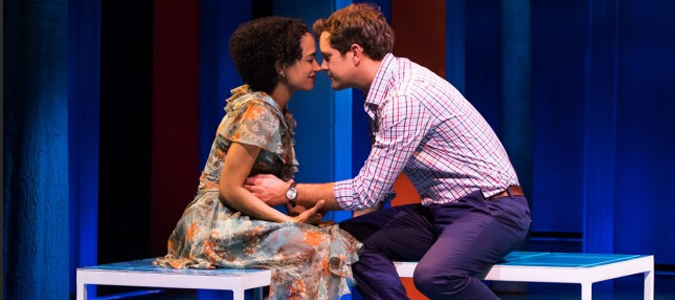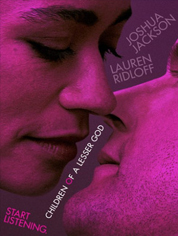

Children of a Lesser God
Opening Night: April 11, 2018
Closing: May 27, 2018
Theater: Studio 54
The Tony®, Drama Desk, and Olivier Award-winning Best Play tells the story of an unconventional teacher at a school for the deaf and the remarkable woman he meets there. It arrives on Broadway in a breathtaking new production starring Joshua Jackson (The Affair, Fringe), Lauren Ridloff (Wonderstruck), and Anthony Edwards (ER).
BUY TICKETSREAD THE REVIEWS:
April 11, 2018
Aside from a brief prologue, the first thing the character Sarah says in “Children of a Lesser God” is — well, I can’t tell you.
Even if I could, it wouldn’t be as funny or as powerful as the way she delivers it, using a combination of poetically vulgar gestures to paint her friend Orin as a suck-up.
That’s because Sarah speaks American Sign Language, and I have only polite English at my disposal. A.S.L. wins, hands down — or, as the case may be, hands up.
The pungency of sign language is not the subject of Mark Medoff’s “Children of a Lesser God,” which opened on Wednesday at Studio 54 in a mixed bag of a Broadway revival directed by Kenny Leon. But it’s a wonderful bonus to the play’s fierce rivalry between those who promote spoken English as the highest attainable form of communication and those who are staunch partisans of silence.
READ THE REVIEWApril 11, 2018
Decades before “mansplaining” came along to fill a void in our national vocabulary, Mark Medoff’s Tony-winning play (and later movie) Children of a Lesser Godprovided both a case study and a denunciation of the infuriating male inclination to tell women just what to feel and how to say it. Now, 38 years after the play’s New York debut, a Broadway revival directed by Kenny Leon at the Roundabout Theatre Company’s Studio 54 starring Joshua Jackson, Lauren Ridloff and Anthony Edwards repeats the lesson to an audience that might not need to be taught. Even with a White House inhabited by a man whose grotesque displays and insults include a resurfaced one aimed at Marlee Matlin, this play no longer has the power to surprise with what was once the unorthodox notion that the “disabled” can speak for themselves, thank you very much, an ability that just might entail rejecting the word “disabled.” Children of a Lesser God lives on now mostly as a well-constructed if somewhat dated relationship drama and as a showcase for its two primary, argument-siding characters, here played by Jackson and Ridloff. Jackson, in a 180 from his taciturn, angry role as the left-behind husband of Showtime’s The Affair, plays James Leeds, the enthusiastic and well-meaning new teacher at a school for the deaf. Leeds, who is not deaf, is our narrator as he recalls his early days at the school (the setting is the 1970s) and, most significantly, falling in love with, and marrying, Sarah Norman (Ridloff, a former Miss Deaf America), a deaf, non-speaking woman who works as a janitor at the school where she’s lived since adolescence, when her exasperated mother abandoned her physically and emotionally.
READ THE REVIEWApril 11, 2018
There’s something to admire about Mark Medoff’s 1979 play “Children of a Lesser God” — even if the just-opened Broadway production of it starring Joshua Jackson and newcomer Lauren Ridloff at Studio 54 is only fitfully engaging and stirring. It’s been nearly 40 years since this drama about the stormy love affair between a deaf woman and a hearing man won a Tony Award for best play. Since then, stories on New York stages in which deafness is part of the dramatic conversation — let alone, the key to it — have been scarce. “Tribes,” a family drama, and Deaf West’s “Spring Awakening,” are recent ones that come to mind. And there’s also … well, that’s about it. For that reason alone “Children of a Lesser God” deserves props. Even better, the revival reminds that the play paints a portrait of a woman who refuses to be molded and insists on agency — an idea that couldn’t be timelier. Moreover, everything actors say, plus music cues, appear as surtitles to make the play accessible.
READ THE REVIEWApril 11, 2018
Mark Medoff wrote “Children of a Lesser God” specifically for Phyllis Frelich, a deaf actress who made her professional debut as the character Sarah Norman in the 1979 production at the Mark Taper Forum and went on to play the part on Broadway the following year. The deaf actress Marlee Matlin appeared opposite William Hurt in the 1986 film version. Now, Lauren Ridloff, who starred as Sarah in the Berkshire Theater production last year, reprises the role on Broadway, continuing the tradition of deaf actresses who come out of nowhere and knock us off our feet. Ridloff is a stunning performer. As slender and graceful as a dancer, she moves like a wood nymph in costumer Dede Ayite’s gauzy dresses, and when she speaks, through American Sign Language, her flashing fingers are hypnotically seductive. There’s also a steely quality to her lithe frame — all the better to embody her character’s proud refusal to insinuate her way into the hearing world. As Sarah’s mother (Kecia Lewis, nicely done) protests to her daughter’s speech therapist, “You’re still trying to force her to speak and lip read so she can pass for hearing.”
READ THE REVIEWApril 11, 2018
If there’s a more indigestible lump of bouncy 1970s pop schmaltz than Paul McCartney’s “Silly Love Songs,” right now it escapes me. It’s one of a handful of intrusive music choices that director Kenny Leon makes in the dreary Broadway revival of Children of a Lesser God, a once-groundbreaking 1979 play by Mark Medoff that today needs no help showing its age. Opening with Stevie Wonder’s “Love’s In Need of Love Today,” played before the action starts to make us absorb the lyrics, the production tips the balance away from the author’s sensitive handling of deaf politics toward the bland reaffirmation that the heart is a more powerful communication tool than the human voice. If that sounds like the melodramatic fodder of a vintage Lifetime movie, you got it. Leon’s sluggish production does eventually gather some steam in the second act, expanding beyond the banal romantic focus of impassioned teacher James Leeds (Joshua Jackson) and reluctant student Sarah Norman (Lauren Ridloff) into more complex issues. When it tightens its focus on the rights of deaf people to choose the terms on which they interact with the hearing world — weighing the virtues of American Sign Language, lip-reading, and speech with conflicting ideologies — you can see why this was an important work back in its time. But Nina Raines’ superior 2010 drama Tribes has since come along to examine related questions in a context both more compelling and less didactic. Not to mention the broader evolution of more enlightened attitudes toward the deaf community and minorities in general.
READ THE REVIEW





















